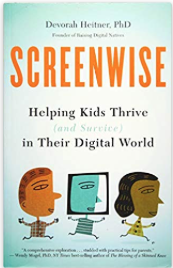As a technology teacher to elementary students and mother of three, it is obvious to me that there has been a major shift in children and technology in recent years. The majority of children I know have constant access to screens of some kind: computers, tablets, and smartphones. This has created a whole new facet of parenting and education.
The Rise of Smartphone Ownership
Tablets started growing in popularity around 20 years ago, and the first smartphone (iPhone by Apple) was introduced just 13 years ago, yet in less than two decades they have almost become household staples. This means that our children have no recollection or concept of a life or world without 24/7 access to all things internet, in the palms of our hands. This is the reality in which we all now live, and it has certainly become a more pertinent issue now that we've all experienced months of distance learning that made such devices vital. As parents, we are faced with the sometimes-daunting challenge of guiding our kids through the digital world.
It’s not surprising to hear that a survey completed in 2017 reported that nearly 80% of Americans now own smartphones. That number has undoubtedly increased since the time of that survey. For our children, it is not a question of if they will get a smartphone but when. We as parents must ask the question: When should my child get a cell phone?
Statistics on Children with Smartphones
If your elementary schooler doesn’t already have their own phone, it’s highly likely that some of their peers do. According to recent research, on average, a child gets his or her first smartphone at 10.3 years old. That same study shows that by age 12, a full 50 percent of children have social media accounts (primarily Facebook and Instagram).
Benefits and Drawbacks of Kids with Smartphones
Certainly there are benefits to children having their own smartphones. There are myriad educational opportunities and applications available on devices, as well as opportunities to be creative. There is obviously a strong potential for social interaction and connection with peers through collaborative games, social media apps, and text messaging. And perhaps the most prominent reason for children to have their own phone is the issue of safety. Your child’s bus route is unpredictable, they’re involved in after-school activities for which you may not always be present, or you simply want them to have a way to contact you quickly, directly in case of an emergency.
And then there is the dark side to children having their own smartphones. More and more research is being done that reveals correlations between screen time and lack of brain development, social skills, and increased mental health issues. There is also the difficulty of developing healthy tech habits, potential for exposure to inappropriate material and content, and the possibility of targeting by an online predator. There is also a very real change in family dynamics with the introduction of personal devices to children. Research suggests correlations between screen/device use in children and an inability to embrace boredom, be creative, be socially present with others, and practice patience because everything is at their fingertips.
Recommended Age for Children to Get Smartphones
Family psychologist and author Dr. Mike Brooks explains that there is no “magical age” for when a child should get a phone because each child, just like each adult, is uniquely wired. Some third graders are more responsible than high school seniors, for example. Yet Dr. Brooks does say that he believes waiting until a child is in seventh or eighth grade is generally a good rule of thumb, given that there brains have had more time to mature. Many technology experts and executives are also recommending that children not be given phones until the age of 14. Bill Gates, renowned co-founder of Microsoft, did not allow his children to have their own cell phones until the age of 14. An entire movement of parents in Austin, Texas, started the “Wait until 8th” initiative to encourage parents to come together and wait to give their children phones until the eighth grade.
As with so many parenting decisions, “When should I get my child a smartphone?” is a difficult question that can ultimately only be determined within your family. But what is true for all parents and families is the need to make an educated, informed decision in order to answer that question.
As you navigate the tumultuous waters of technology as a family, consider the following resources to help you along the way...
Tech-related Parenting Book (and Video) Recommendations
Screenwise by Dr. Devorah Heitner - This book encourages parents to not just monitor their kids' use of technology but mentor them, using our lifetime of social wisdom to develop the skills needed to use technology well.
The Tech-Wise Family by Andy Crouch - Crouch combines research from the Barna Group with his own experience as a parent to offer parents insight into setting healthy technology parameters as a family.
Connect by Kirk Cameron - This documentary provides parents with input from experts on social media and technology use in young people.

Author Tony Reinke - Christian author and journalist Tony Reinke has written books and articles on various topics, but one of his central themes is technology. An entire section on his website is dedicated to smartphones.
Good Pictures Bad Pictures by Kristen Jenson - This book tackles the difficult but important topic of inappropriate content that our children can be exposed to on the internet, providing a way for parents to engage in conversation. There is also a junior version for younger readers.
Additional Tech-Parenting Resources
Family Media Plans - this website offers a customizable template for you and your family to develop a media use plan specific to your needs. The template is very detailed. A good rule of thumb: in reading this sample plan, if you feel that your child will struggle to understand the plan or abide by it, this may be an indicator that they are not ready for a smartphone.
"Technology in Education" - Episode 104 of Navigating Your Child's Education: Podcast for Parents offers insights from education experts on the prevalence of technology in education today and offers a basic framework for teaching our children to embrace their humanity alongside the existence of technology.
/Logos/Horizontal%20Academic%20Logo%20for%20Light%20Backgrounds.png)
/Logos/Horizontal%20Academic%20Logo%20for%20Dark%20Backgrounds.png)






.jpg)
